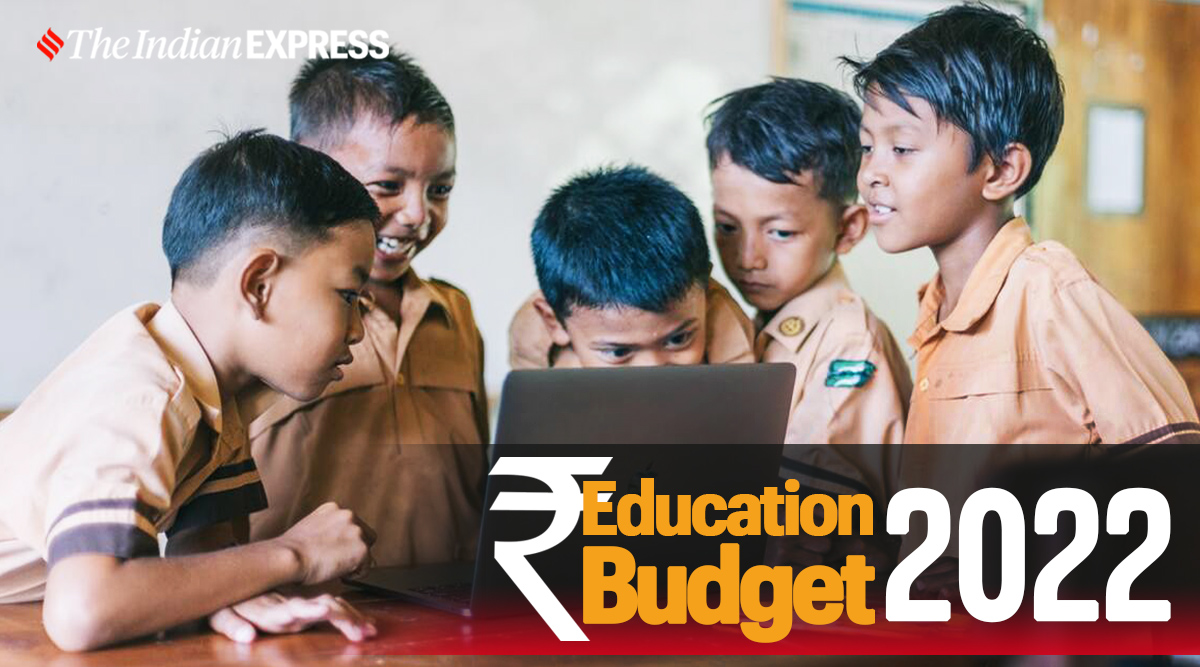 The budget also highlighted the use of regional languages in online and offline learning. (Graphics by Abhishek Mitra)
The budget also highlighted the use of regional languages in online and offline learning. (Graphics by Abhishek Mitra) Pakshal Sevak, a 7-year-old boy from Udaipur in Rajasthan, has not stepped into a school for the past one and a half years. Pakshal had to drop out of class 2 because learning had moved online amid the coronavirus pandemic and his family had no means to buy a smartphone or a laptop. His mother, Roosiya Sevak, has been waiting for the schools to reopen so that she can get him enrolled again.
“We were not able to afford the school fee and kids are anyway not learning anything in online classes. I will enrol him again once the schools reopen but I am worried about the learning loss that happened in the last two years,” Roosiya told indianexpress.com.
Several experts said the recently-announced Union Budget 2022 “fails to address” the issues of such marginalised people.
The Budget announced by Union Finance Minister Nirmala Sitharaman has not outlined any plan for addressing the learning loss that occurred in the last two years, said Pradeep Kumar Choudhury, Assistant Professor, Zakir Husain Centre for Educational Studies, Jawaharlal Nehru University (JNU).
“The state is grossly mistaken that learning gaps can be bridged with TV channels. Bringing digitisation with no proper thought is dangerous and will create inequalities socially and in terms of educational opportunities. Learning through TV cannot substitute the classroom teaching but the budget did not focus on teacher training, school infrastructure etc,” Choudhury said.
The pandemic has highlighted the need for more teachers, better infrastructure and more classrooms so that learning in rural areas, where digital resources are scarce, is not disrupted even if a pandemic hits us again, he added.
This year, the budgetary allocation for teacher training and adult education has been drastically reduced from Rs 250 crore in 2021-22 to Rs 127 crore in 2022-23. Moreover, in 2011, the education budget was 11.4 per cent of the total budget, which came down to a low of 10.2 per cent in 2016-17. In 2020-21, it was 10.4 per cent.
“The National Education Policy (NEP) 2020 was launched last year with a huge fanfare. It advocated that 6 per cent of GDP should be allocated to the education sector. But, this year’s Budget comes down to less than 2 per cent. The education budget may have crossed a landmark of 1 lakh crore but it has been decreasing as a percentage of total expenditure,” said Anil Swaroop, former secretary, Department of School Education and Literacy, Government of India.
In terms of significant announcements focussing on school education, the Budget talked about expanding the One Class One TV channel initiative under the PM e-Vidya scheme and increasing it to 200 channels from the existing 20.
However, despite the push in the digital education field, allocation under the digital India e-learning programme, which includes the PM e-Vidya scheme, has been reduced to Rs 421.01 crore in 2022-23 from Rs 645.61 crore in 2021-22.
The founding director of IIT Indore, Pradeep Mathur, recalled when the institute had adopted 5 schools in the nearby villages. “One of the issues that plague India is the pathetic condition of schools in rural areas, Tier-II cities. The Budget failed to put the required emphasis on the long-lasting issues, which have been there before Covid and will continue to exist,” he said.
Mathur added that TV can be a decent source of information in communities where personalised digital gadgets have not reached yet but it does not have the potential to improve the quality of learning because of its one-way communication approach.
Swaroop agreed with IIT-Indore’s Mathur. “This budget virtually ignores the aspect of minimising the learning loss that happened in the last two years. A void has been created as a consequence of covid and TVs cannot be in prime focus once the schools reopen. The announcement to facilitate supplementary learning in regional language for classes 1 to 12 is a welcome move but what about the primary education?” Swaroop asked.
Atul Kumar, the principal of Sarvodaya Vidyalaya in New Delhi’s Dwarka, said the Budget did not focus on online learning, which will undoubtedly become an integral part of learning in the post-pandemic era.
“While TVs are a useful medium in communities where resources are scarce but the effectiveness of learning is still questionable. It appears as if this year’s Budget has not been made after consultations with teachers working at the grassroots as there are no possible solutions to the problems that we faced amid Covid. India as a country has limited resources and we must prioritise where we spend them. Cutting down on teacher training is not a step in the positive direction,” he added.
- The Indian Express website has been rated GREEN for its credibility and trustworthiness by Newsguard, a global service that rates news sources for their journalistic standards.

